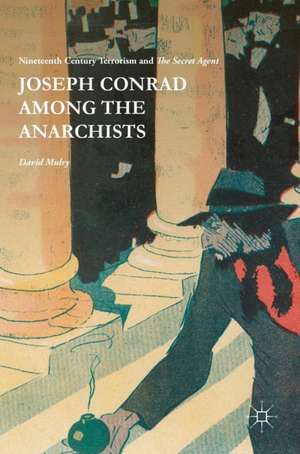Joseph Conrad Among the Anarchists: Nineteenth Century Terrorism and The Secret Agent
Autor David Mulryen Limba Engleză Hardback – 7 oct 2016
Preț: 497.77 lei
Preț vechi: 585.62 lei
-15% Nou
Puncte Express: 747
Preț estimativ în valută:
95.26€ • 98.89$ • 79.43£
95.26€ • 98.89$ • 79.43£
Carte tipărită la comandă
Livrare economică 22 martie-05 aprilie
Preluare comenzi: 021 569.72.76
Specificații
ISBN-13: 9781137502889
ISBN-10: 1137502886
Pagini: 186
Ilustrații: VII, 194 p. 10 illus. in color.
Dimensiuni: 148 x 210 x 17 mm
Greutate: 0.38 kg
Ediția:1st ed. 2016
Editura: Palgrave Macmillan US
Colecția Palgrave Macmillan
Locul publicării:New York, United States
ISBN-10: 1137502886
Pagini: 186
Ilustrații: VII, 194 p. 10 illus. in color.
Dimensiuni: 148 x 210 x 17 mm
Greutate: 0.38 kg
Ediția:1st ed. 2016
Editura: Palgrave Macmillan US
Colecția Palgrave Macmillan
Locul publicării:New York, United States
Cuprins
Introduction- Chapter 1: Conrad and the Imaginative Shades.- Popular Accounts of the Greenwich Bombing Bomb Sensation.- The Dynamite Novel and The Secret Agent.- The Anarchists in the House. - “Verloc”: The Origins of the Text.- Patterns of Revision in The Secret Agent.- The Perfect Detonator.- Notes. - Bibliography
Recenzii
“Clearly well-versed in Conrad and the genre of The Secret Agent, Mulry’s explication and interpretation of anarchism leaves much to be desired. … David Mulry’s Joseph Conrad Among the Anarchists is a text that should be investigated for those interested in The Secret Agent or Conrad’s drafting and revisions processes … .” (Michelle M. Campbell, Anarchist Studies, Vol. 26 (02), 2018)
Notă biografică
David Mulry is Professor of English at the College of Coastal Georgia, USA.
Textul de pe ultima copertă
This book looks at the inception, composition, and 1907 publication of The Secret Agent, one of Joseph Conrad’s most highly regarded political novels and a core text of literary modernism. David Mulry examines the development and revisions of the novel through the stages of the holograph manuscript, first as a short story, then as a serialized sensation fiction in Ridgway’s Militant Weekly for the American market, before it was extensively revised and published in novel form. Presciently anticipating the climate of modern terror, Conrad’s text responds to the failed Greenwich Bombing, the first anarchist atrocity to occur on English soil. This book charts its historical and cultural milieu via press and anarchist accounts of the bombing, to place Conrad foremost among the dynamite fiction of revolutionary anarchism and terrorism in the late nineteenth and early twentieth centuries.
